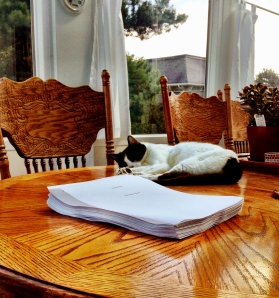Artists don't get down to work until the pain of working is exceeded by the pain of not working. ~ Stephen DeStaebler
A mighty struggle these past weeks to settle down and write. Late October arrives and I haven't written anything new since July. Oh, I've been busy: one novel completed and in others' capable hands; another novel revised and ready for critique; two short stories sent out into the world, in search of acceptance and homes.
But I'm restless and panicky, wondering how much conditioning I've lost in the months since I last faced down a blank page.
Starting a new novel is an emotional gambit: vulnerability—certain; risk of failure—absolute; excitement—total. First come the heady days of pouring ink onto the page: the spark of an idea that transforms into character sketches, themes, research notes and eventually, the plot outlines that precede the first lines of typed prose.
The first day of writing. The second day of writing. The first week. Frustration borne of restlessness, feeling words spilling over the dam, but having my fingers in too many holes to catch them all. Attention span shifting this way and that and days of grinding out words I can barely hear through the chatter in my head.
A perfectly good excuse. I have one. I want to tell you. I'm bursting to tell you. A day when the course of my life shifts, perhaps just a bit, perhaps seismically, like a train shunted onto a new track at the last moment to a destination yet unknown—not the next station in the next small town, surely, but maybe the one after that or maybe a long grinding roll onto the big city. I'll tell you as soon as I can. It's the blog post I've been dreaming of writing.
But no matter what happens next, I must be present in the now. I must do my job. I must write.
A sucker for the carrot of simple goals, I pop open the Project Targets box in Scrivener and reset my daily word count. I sense this story will not come as easily as The Crows of Beara—10,000 words a week netted me a 105,000 word novel in ten weeks. For all that is happening external to this novel, for all that is happening inside the story, I need to give myself room to breathe. I set my session goal for 1,500 words, with an eye toward a completed first draft by March. A winter of writing in cafés and in the library's bright and warm Reading Room.
A few days of hitting my target, even though it takes hours. Upon hours. I force myself to stay in the hardback chair at the library, draining the laptop battery, stomach groaning in hunger, eyes dry and throbbing. Nothing is coming easily. I reread, move scenes around. It's there. There story is there. Too much brain dump exposition and back story—I know that, but I'll find a way to fit it in later or get rid of it. I remind myself: stop editing, stop worrying whether what you've got works, keep writing until you get to what does.
And then yesterday. Doing what I knew I had to. Shifting my protagonist's POV from first person to third. There is much about this story (entitled Tui (tōō-ē), a native bird of New Zealand and in my novel, the name of a child in need of wings to fly away) that is so personal to my life—not the events or the plot—but the emotions, the longings, the hurts. Yet, by keeping the protagonist's voice in first person, I struggle to separate her "I" from my eye, her "me" from my own mind. So, Holly Dawes, welcome to the world. I'll step back now and let you go your own way.
Today. Two hours, two thousand words. Time enough left over to run seven miles. To wash the car. To write a book review. To write this blog post. To get some perspective. To take the long view.

